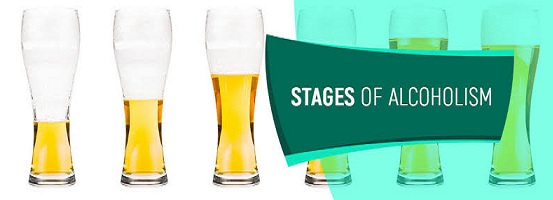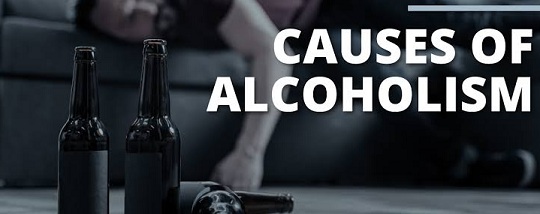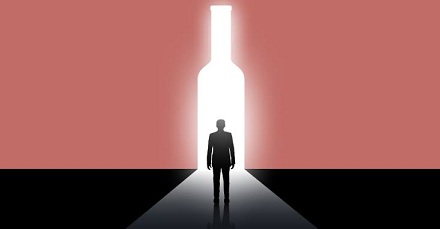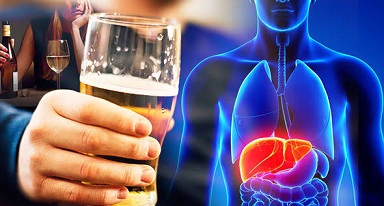What is Alcohol Addiction?
Alcohol addiction is a chronic (long-term), and progressive disease with problems with control over drinking, problems with alcoholism, alcohol withdrawal, problems with physical dependence on alcohol, and withdrawal symptoms.
If you are addicted to drinking alcohol, you will not be able to decide how much alcohol you will drink, how long you will drink, or what the consequences will be.
It happens when you drink so much alcohol that your body eventually becomes addicted to alcohol. When this happens, alcohol becomes an essential thing in your life.

People with alcohol addiction are not able to quit alcohol despite its harmful consequences, such as losing jobs or problems in relationships with people. He comes to know that his alcohol addiction affects his life negatively, but he does not stop himself from drinking it.?
Stages of Alcoholism

How many stages of alcohol addiction occur?
There are three stages of alcohol addiction
-
Initial Phase
The early phase of alcohol addiction is often difficult to detect because it does not have any visible impairment or damage in the beginning. During this stage, the body of the drinker builds tolerance towards him, so the person can drink more alcohol without losing control.
The way to identify this stage of addiction is to understand its social aspects. If you feel that you drink continuously to deal with stress or other problems, then you may be in the initial stage of alcohol addiction.
Click Here To Read: What Causes Depression
-
Middle stage
During the intermediate phase of alcohol addiction, you will experience physical and social changes. You may get blackout after drinking too much alcohol. You will have a craving for alcohol, and if you do not get it, you may experience symptoms.
-
Last step
The last phase of alcohol addiction is when you lose control, and it starts affecting you physically, socially, and mentally. At this time, you may have been so much into drinking alcohol that you have destroyed your relationships with friends and family.
Blackouts occur more often in this stage, and you cannot sleep at night without drinking alcohol. Many people can handle their jobs even at this level, but they are not able to do so for a long time. Also, if they are physically able to function, their mind remains only in alcohol.
Whether you realize it or not, but due to excessive drinking, you start experiencing medical problems. Drinking alcohol can cause hepatitis, liver cirrhosis, recurrent respiratory infections, and pancreatitis. In severe cases, alcohol can also cause heart failure or brain damage.
Alcoholism Symptoms

What are the symptoms of alcohol addiction?
Symptoms of alcohol addiction are based on the behavioral and physical consequences that result from it.
People suffering from alcoholism may have the following symptoms –
- Drinking alcohol alone.
- Drinking more to feel the effects of alcohol (having a high tolerance).
- Getting violent or angry when asked about your drinking habits.
- Don’t eat or eat correctly.
- Not keeping personal hygiene.
- Do not go to work or school due to drinking alcohol.
- Unable to control alcohol consumption.
- Finding excuses for drinking alcohol.
- Continuing drinking, even if there are legal, social, or economic problems.
- Abandoning important social, occupational or recreational activities due to alcohol use.

People suffering from alcohol addiction may have the following physical symptoms –
- Wine craving.
- Other symptoms, including nausea and vomiting if you do not get alcohol.
- Vibration the next morning after drinking alcohol.
- Losing memory after a night of drinking.
- Diseases such as alcoholic ketoacidosis (including dehydration type symptoms) or cirrhosis.
Causes of Alcoholism

What causes alcohol addiction?
The cause of alcohol addiction is still unknown. This addiction occurs when you drink so much alcohol that chemical changes occur in your brain. These changes make drinking alcohol enjoyable for you, which make you desire to drink more alcohol, even if it causes harm.
Ultimately, the pleasant feelings associated with alcoholism go away, and its people drink it to stop the symptoms after quitting alcohol. These symptoms can be quite unpleasant and even dangerous.

Alcohol addiction usually develops slowly over time. It can also be a family.
Prevention of Alcoholism

How can alcohol addiction be prevented?
Early diagnosis can prevent alcohol addiction in adolescents. For young people, the likelihood of getting drunk depends on the influence of their parents, peers, and other ideals.
How much they are influenced by alcohol advertising, how soon they start using alcohol, their psychological need for alcohol, and genetic factors can increase the risk of alcohol addiction.
If you have a teenager around, pay attention to their symptoms that may indicate an alcohol addiction problem. These symptoms are ?
- Losing interest in activities and hobbies and personal appearance.
- Bloodshot eyes, inability to speak correctly, coordination problems, and memory problems.
- Changing relationships with friends.
- Failure to study and problems in school.
- Repeated mood changes and defensive behavior.
You can help a teen stop alcohol addiction. Be a good example for him and talk openly with your child and spend time with him and be actively involved in his life.?
Alcoholism Diagnosis

How is alcohol addiction diagnosed?
Identifying alcohol addiction is not always easy for the doctor. If the doctor suspects an alcohol problem, he can ask the person a variety of questions, if the person responds in a certain way, the doctor can use a standard formulated question.
Click Here to Read: 60 Interesting Depression Facts
The following symptoms may indicate alcohol addiction:
Tolerance of Alcohol
A person needs a considerable amount to feel the effects of alcohol. However, when the liver becomes impaired, and the alcohol is not digested well, this tolerance may be reduced. Damage to the central nervous system can also reduce tolerance levels.?
Effect on not drinking alcohol
When a person abstains or cuts down on alcohol, they may experience tremors, insomnia, nausea, or anxiety. Usually, the person tends to drink more to avoid these symptoms.
Drinking more than thought
Individuals tend to drink more than they think or drink for an extended period.
Unsuccessful attempts to cut down
The person continually tries to reduce alcohol consumption, but is unable to succeed or has a persistent desire to quit alcohol.
Taking time
The person spends a lot of time acquiring, using, or releasing alcohol.
Separation
The person is separated from recreational, social, or professional activities.
Perseverance
The person does not give up drinking alcohol; however, he realizes that it is harming him physically and psychologically.
Alcoholism Tests

Blood tests
Blood tests can only show recent alcohol consumption. He cannot tell if a person has been consuming alcohol for a long time. If a blood test shows that there is an increase in the size of red blood cells in the body, it may be an indication of long-term alcohol consumption.
Carbohydrate-deficient transferrin (CDT) tests
This is a test that helps detect heavy alcohol consumption. This is also a blood test.
Alcohol Treatment

How is alcohol addiction treated?
The following remedies may aid in quitting alcohol addiction –
-
Advice
A qualified counselor can help you by telling you how to quit alcohol based on your problems and then formulate a plan to avoid drinking. Cognitive-behavioral therapy is commonly used to treat alcohol dependence.?
-
Treating underlying problems
An alcoholic may have self-esteem, stress, anxiety, depression, or some other mental health problems. It is also essential to address these problems.?
-
Medications that trigger a severe alcohol reaction
Some drugs cause a severe reaction to alcohol, such as nausea, flushing (feeling hot in the face, neck, ears, and torso), vomiting, and headaches.?
Click Here To Read: 75 Depression Quotes
-
Medications for the desire to drink alcohol
Some medicines can help fight the urge to drink alcohol.
-
Detoxification
Some medicines are used to prevent the symptoms caused by not drinking alcohol. Its treatment lasts for four to seven days.
Alcoholism Risks

What are the risk factors for alcohol addiction?
Following are the risk factors for alcohol addiction –
Drinking alcohol regularly
Drinking too much alcohol daily can cause physical dependence on alcohol.
Age
People who start drinking at an early age are at higher risk of having an alcohol addiction problem or physical dependence on it.
Family History
The risk of alcohol addiction is higher for those whose parents or other close relatives are already prone to it.
Depression and other mental health problems
People who have some issues, such as anxiety, depression, or bipolar disorder, are more likely to have alcohol addiction problems.
Social and cultural factors
Friends or close partners who regularly drink alcohol may increase your risk of alcohol addiction. Sometimes the attractive ways of drinking alcohol shown in the media can also give the message that drinking alcohol is fine.?
Medications and Alcohol
Some medicines interact with alcohol and increase its toxic effects. Drinking alcohol while taking these drugs can either increase or decrease its effectiveness or may even make it dangerous.
Complications of Alcoholism

Drinking excessive amounts of alcohol can cause the following complications
- Exhaustion – The person is tired most of the time.
- Loss of memory – particularly the short-term memory of a person.
- Eye muscle weakness – A person’s eye muscles can be quite weak.
- Liver diseases – A person is significantly more likely to get Hepatitis and Cirrhosis.
- Gastrointestinal Complications – The person may have gastritis or pancreas damage.
- High Blood Pressure – Drinking too much alcohol regularly can increase a person’s blood pressure.
- Heart problems – Drinking too much alcohol regularly can lead to cardiomyopathy (loss of heart muscle), heart failure, and stroke.
- Diabetes – Alcohol drinkers are more likely to develop diabetes type 2.
- Menstrual problems – Drinking alcohol usually causes menstrual issues.
- Stomach defect – Drinking alcohol can cause men to have a deficiency.
- Infant related problems – Those pregnant women who consume alcohol during pregnancy may have problems with their children from birth.
- Bone thinning – Drinking individuals have issues with bone thinning because alcohol interferes with the production of new bones. This means an increased risk of fracture.
Click Here To Read: 25 Ways To Simplify Your Life
- Cancer – Drinking alcohol carries a very high risk of getting many types of cancer.
- Accidents – Drinking alcohol increases the chances of car accidents, injuries, etc.
- Work problems – Employment problems, unemployment, and school problems are often related to alcohol.
- Suicide – The number of people who commit suicide after drinking alcohol is very high.
- Mental illness – Excessive use of alcohol increases the risk of mental illness and may worsen existing mental illnesses.
Note: Depression Cure does not provide any type of medical advice, diagnosis, or treatment.





